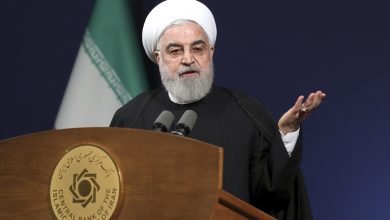
The Trump administration plans to strengthen enforcement of Iran sanctions now that it’s driven oil exports down to unprecedented lows, with a plan to increase pressure on global shippers, Chinese state-owned enterprises and exporters of raw materials used in metal production.
The initiatives, described by two U.S. officials familiar with the situation and confirmed by outside analysts aware of the administration’s plans, mark the next phase of President Donald Trump’s bid to squeeze Iran’s economy so hard that the government has no choice but to negotiate new limits on its nuclear and ballistic-missile programs.
Asked about the new moves, Brian Hook, the State Department’s Iran envoy, said in a statement Tuesday that the U.S. is now turning to “all remaining sources of export revenue, including from petrochemicals and metals that are subject to U.S. sanctions.”
At the center of the administration plan, which hasn’t been previously reported, will be guidance issued via the State and Treasury Departments warning ship insurers, banks, charter companies, port owners, crews and captains that they all face sanctions exposure if they can’t account for the legitimacy of the cargoes they carry.
Despite an array of U.S. sanctions since Trump withdrew from the Iran nuclear deal in 2018, Tehran has refused to buckle to American demands for a more comprehensive deal and has moved forward with efforts to enrich uranium. At the same time, President Hassan Rouhani has confronted street protests against price increases and corruption that has left his government cornered politically, potentially benefiting hard-liners even more opposed to Washington.
One element of the new U.S. effort will focus on the automatic identification system used by ships, according to the people. The administration will demand that insurers and ship owners pay closer attention to when ship transponders are turned on and off, and steer clear of doing business with vessels with questionable histories.
The enforcement effort amounts to a renewed bid to overhaul the often shadowy world of global shipping, in which the true owners of ships are easily disguised, vessels fly under the flags of countries that rarely punish them for wrongdoing and insurers and banks turn a blind eye to illicit behavior.
It also aims to close one of the most common means of avoiding sanctions: the ship-to-ship transfers at sea of crude oil, refined petroleum products and bulk goods.
“The U.S., in particular, has started monitoring what these tankers are up to much more carefully,” Hugh Griffiths, the former head of the United Nations panel overseeing sanctions on North Korea, said in an interview. “The main means by which sanctions are being evaded, to the tune of hundreds of millions of dollars in each incident, is through a ship-to-ship transfer in which the AIS is switched off.”
Many of the initiatives planned by the U.S. echo recommendations spelled out in Griffiths’s report from March that highlighted sanctions-busting by North Korea, chiefly through ship-to-ship transfers.
The administration sent a powerful signal to the shipping industry, as well as nations that help Iran evade restrictions, when it imposed sanctions against the Dalian units of China COSCO Shipping Corp. in September. That move led to increases in the cost of transporting oil globally.
One administration official said that should be taken as a signal that the U.S. is willing to target other Chinese state-owned enterprises, including those that operate or lease out terminals and pipelines.
The U.S. is telling ship owners to protect themselves during ship-to-ship transfers by taking photographs with their mobile phones of the crew of the other ship. That would help expose the identity of any potential sanctions violators with whom they unknowingly do business.
The administration is also telling players in the maritime sector that they should review guidance issued in connection with North Korea and assume it also applies to Iran.
“It’s been a huge wake-up call for the shipping industry, which has been scrambling and rates are still escalated,” said Elizabeth Rosenberg, a former Treasury official who’s now a senior fellow at the Center for a New American Security in Washington. At the same time, she said the U.S. has also sought to clarify to shippers that there are limits to the sanctions and they won’t be at risk if they avoid Iran-related business.
“The Treasury Department has gone to great lengths to explain the limitations of exposure,” Rosenberg said. “It serves the purposes of Iran hard-liners that this is vastly more aggressive, but that’s not entirely true.”
Another element of the plan is to target exporters of graphite electrodes and needle coke, two key components for steel-making, as Iran shifts its focus away from oil and toward metals in response to sanctions.
“The Iranians use evasive practices, and companies should be protecting their business and reputations through enhanced diligence,” Hook, the Iran envoy, said. “We have a very good idea of the entities and jurisdictions that are skirting our sanctions.”
Oil Cut
Hook displayed his penchant for unconventional approaches to enforcing sanctions earlier this year when he emailed the captain of an Iranian tanker carrying oil to Syria and offered him a multimillion-dollar reward to take the vessel to a port where it could be impounded by the U.S. The captain declined.
The Trump administration says sanctions have cut Iran’s oil exports by more than 2 million barrels a day and pushed oil revenue down by 80%. The new effort has the backing of Iran hawks in the U.S. who have long argued for more measures to limit Iranian revenue, regardless of the source.
“Petrochemicals are a major source of hard currency export revenue to Iran. Given that the oil shipments have dropped so radically, the U.S. is looking for non-oil export revenue,” said Mark Dubowitz, the chief executive of the Washington-based Foundation for Defense of Democracies. “While they’ve been putting sanctions on Iran, the real key is the enforcement piece.”
Dubowitz’s organization has proposed even further restrictions on how Iran spends its money as part of efforts to ensure that a future U.S. administration can’t undo measures imposed by Trump. The organization has submitted a memo to the State and Treasury Departments arguing that Iran should only be allowed to spend money currently sitting in overseas escrow accounts on humanitarian goods.







